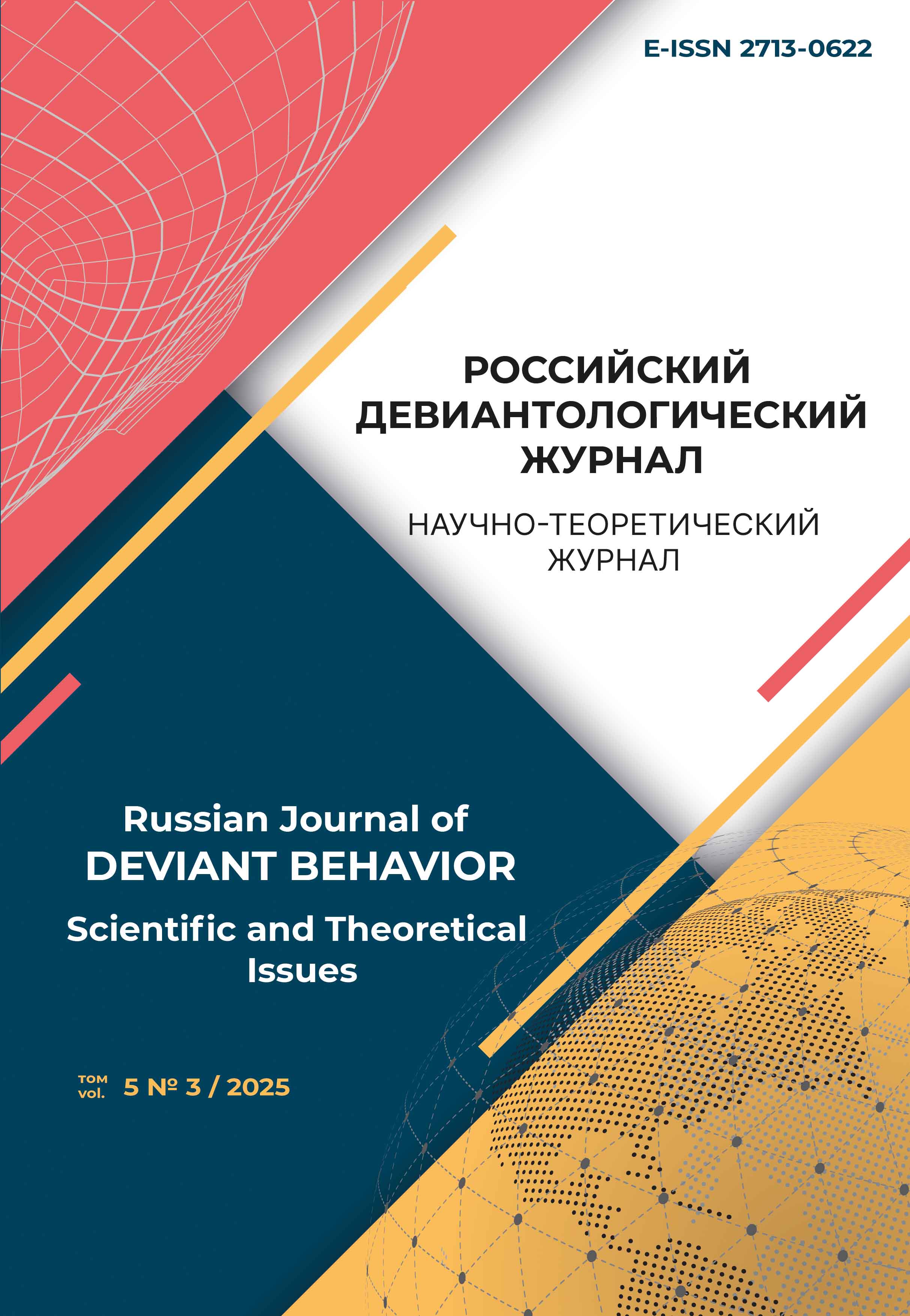employee from 01.01.2020 to 01.01.2025
Moscow, Moscow, Russian Federation
UDC 159.9
Introduction. The problem of students’ aggression against teachers represents a significant concern in contemporary researches on the educational environment’s safety. The interdependent context of relations between actors in the educational process is complicated by the negative influence of society, creating risks of victimisation for teachers. In this regard, it is relevant to consider forms and practices of teachers’ protection aimed at preventing and dealing with the consequences of students’ aggression against them. Materials and methods. The research provides an analysis of common practices and forms of teachers’ protection deeply rooted in aggressive students’ behavior issues. Results. The carried out analysis of protection forms aimed at both dealing with the consequences of aggressive behavior of students against teachers and its preventing revealed that they can be implemented through legal protection, screening and monitoring studies, infrastructure decisions and organisational and managerial practices by organising training programmes for teachers, administrative and collegial support, working with students and their parents, using the mass and social media, as well as building the community influence. Conclusion. The analysis substantiates the need for implementing a comprehensive systemic approach aimed at protecting teachers from students’ aggression.
aggression, protection, prevention, teachers, educators, students
1. Machenin, A. A. (2016). Sobiratel'nyj obraz shkol'nogo uchitelya v otrazhenii tele/kino/internet mediaprostranstva. Mediaobrazovanie, 3, 23–48.
2. Rean, A. A., Egorova, A. V., Konovalov, I. A., Kuz'min, R. G. (2022). Podrostkovaya agressiya v otno-shenii uchitelya: opyt stolknoveniya i svyaz' s lichnostnymi faktorami. Sibirskij psihologicheskij zhurnal, 85, 118–143. https://doi.org/10.17223/17267080/85/6
3. Rean, A. A., Egorova, A. V., Kuz'min, R. G., SHevchenko, A. O. (2023). Vzaimosvyaz' lokusa kont-rolya uchitelya i nepryamoj agressii uchashchihsya po otnosheniyu k nemu. Mir psihologii, 3, 231–250. https://doi.org/10.51944/20738528_2023_3_231
4. Rean, A. A., Konovalov, I. A., Kuz'min, R. G. (2025). Posledstviya dlya podrostkov – zhertv agressii: predstavleniya uchitelej s raznym urovnem agressivnosti. Nacional'nyj psihologicheskij zhurnal 20 (4), 210–222. https://doi.org/10.11621/npj.2025.0416
5. Rean, A. A., Konovalov, I. A., Novikova, M. A., Molchanova, D. V. (2021). Profilaktika agressii i destruktivnogo povedeniya molodezhi: Analiz mirovogo opyta: monografiya. Saint-Petersburg: Izdatel'sko-poligraficheskaya kompaniya «KOSTA».
6. Solov'eva, T. S. (2018). Status uchitelya v sovremennom rossijskom obshchestve. Social'noe prostrans¬tvo, 1 (13), 1–17. https://doi.org/10.15838/sa/2018.1.13.3
7. Temnova, L. V., Novikova, V. S. (2022). Mobbing shkol'nogo uchitelya v sovremennoj obrazova¬tel'noj srede. Vestnik Yugorskogo gosudarstvennogo universiteta, 4 (67), 206–216. https://doi. org/10.18822/byusu202204206-216
8. Aldridge, J. M., & McChesney, K. (2021). Parents’ and caregivers’ perceptions of the school climate: development and validation of the Parent and Caregiver Survey (PaCS). Learning Environ¬ments Research, 24, 23–41. https://doi.org/10.1007/s10984-020-09308-z
9. Berger, E., Reupert, A., & Campbell, T. C. et al. (2022). A Systematic Review of Evidence-Based Well¬being Initiatives for Schoolteachers and Early Childhood Educators. Educational Psychology Review, 34 (4), 2919–2969. https://doi.org/10.1007/s10648-022-09690-5
10. Cuellar, A. E., & Markowitz, S. (2015). School suspension and the school-to-prison pipeline. Inter¬national Review of Law and Economics, 43, 98–106. https://doi.org/10.1016/j.irle.2015.06.001
11. De Cordova, F., Berlanda, S., Pedrazza, M., & Fraizzoli, M. (2019). Violence at School and the Well-Be¬ing of Teachers. The Importance of Positive Relationships. Frontiers in psychology, 10, 1807. https://doi.org/10.3389/fpsyg.2019.01807
12. Espelage, D., Anderman, E. M., & Brown, V. E. et al. (2013). Understanding and preventing violence directed against teachers: Recommendations for a national research, practice, and policy agen¬da. American Psychologist, 68 (2), 75–87. https://doi.org/10.1037/a0031307
13. Martinez, A., McMahon, S. D., Espelage, D., Anderman, E. M., Reddy, L. A., & Sanchez, B. (2015). Teachers’ Experiences With Multiple Victimization: Identifying Demographic, Cognitive, and Contextual Correlates. Journal of School Violence, 15 (4), 387–405. https://doi.org/10.1080/15 388220.2015.1056879
14. McMahon, S. D., Bare, K. M., & Cafaro et al. (2023b). Understanding parent aggression directed against teachers: A school climate framework. Learning environments research, 26 (3), 915– 931. https://doi.org/10.1007/s10984-023-09460-2
15. McMahon, S. D., Cafaro, C. L., Bare, K., Zinter, K. E., Murillo, Y. G., & Lynch, G. et al. (2022a). Rates and Types of Student Aggression against Teachers: A Comparative Analysis of U.S. Elemen¬tary, Middle, and High School. Social Psychology of Education, 25 (4), 767–792. https://doi. org/10.1007/s11218-022-09706-6
16. McMahon, S. D., Martinez, A., Reddy, L. A., Espelage, D. L., & Anderman, E. M. (2017). Predicting and reducing aggression and violence toward teachers: Extent of the problem and why it mat¬ters. In P. Sturmey (Ed.), The Wiley handbook of violence and aggression (Volume 3. Societal interventions, pp. 1335–1350). Hoboken, NJ: John Wiley & Sons.
17. Nwoko, J. C., Emeto, T. I., Malau-Aduli, A. E., & Malau-Aduli, B. S. (2023). A Systematic Review of the Factors That Influence Teachers' Occupational Wellbeing. International journal of environmen¬tal research and public health, 20 (12), 6070. https://doi.org/10.3390/ijerph20126070
18. Perry, A. H., Martinez, A., & Reddy, L. A. et al. (2024). Addressing violence against educators: What do teachers say works? School Psychology, 39 (5), 488–498. https://doi.org/10.1037/spq0000576
19. Riley, K., Ellis, S., Weinstock, W., Tarrant, J., & Hallmond, S. (2006). Re-engaging disaffected pupils in learning: insights for policy and practice(R). Improving Schools, 9 (1), 17–31. https://doi. org/10.1177/1365480206061994
20. Stilwell, S. M., Guzmán, P., Varela, J., McMahon, S. D., Bare, K., Heinze, J., & Zimmerman, M. (2025). Protecting Educators: A Scoping Review of Interventions That Address Teacher Victimization. Behavioral Sciences, 15 (2), 214. https://doi.org/10.3390/bs15020214
21. Stilwell, S. M., Heinze, J. E., Hsieh, H. F., Torres, E., Grodzinski, A., & Zimmerman, M. (2024). Positive youth development approach to school safety: a comprehensive conceptual framework. Jour¬nal of school health, 94 (9), 848–857. https://doi.org/10.1111/josh.13485
22. Vakili, R., Vakili, S., Ajilian Abbasi, M., & Masoudi, S. (2024). Overcrowded Classrooms: Challeng¬es, Consequences, and Collaborative Solutions for Educators: A Literature Review. Medical Education Bulletin, 5 (2), 961–972.
23. Weiler, S. C., & Cray, M. (2011). Police at school: A brief history and current status of school resource officers. The Clearing House: A Journal of Educational Strategies, Issues and Ideas, 84 (4), 160–163.














